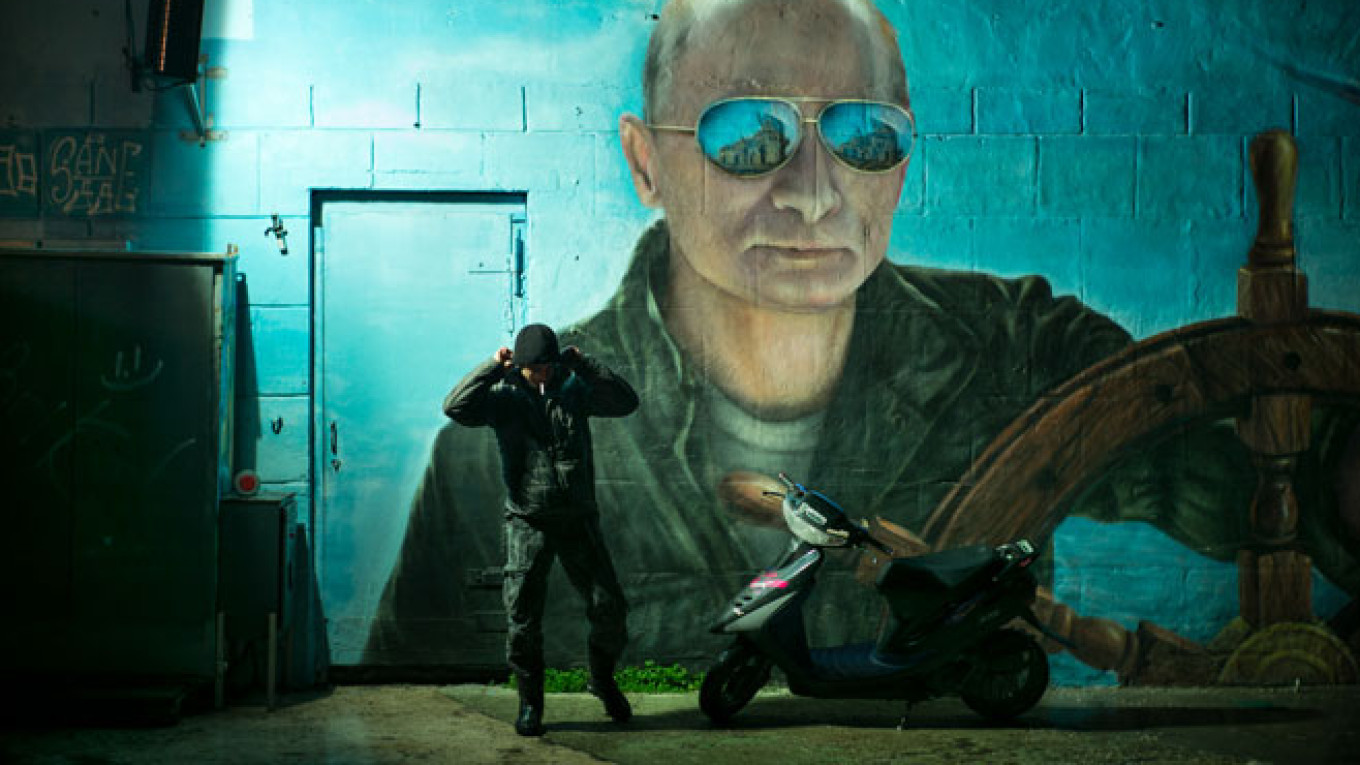DZHANKOI, SIMFEROPOL, KERCH, Crimea — The soldiers carry assault rifles and stand guard, some of them wearing black balaclavas to protect their faces. No more than 100 meters and a bridge separate them from the nearest Ukrainian positions.? There, against the gray sky, a blue and yellow flag flickers above a makeshift hut.
The Chongar-Dzhankoi bridge crossing is one of Crimea's three land connections with the Ukrainian mainland. It was here that so-called "self-defense" vigilante groups, backed by Russian troops, set up camp in February 2014. And it is here that one of the world's most disputed borders begins.
Two years on, a disputed referendum and a controversial annexation later, few expect this border to be redrawn any time soon. Most of the soldiers working around it say there is little to do.
"It's quiet now," says one of the Russian guards as I pass the checkpoint.
Menace, on the other hand, seems yet to fully disappear from these muddy fields. As the conversation moves to an interrogation room, three guards ask what this article will be about.
"You'd better be positive in what you write," one says.
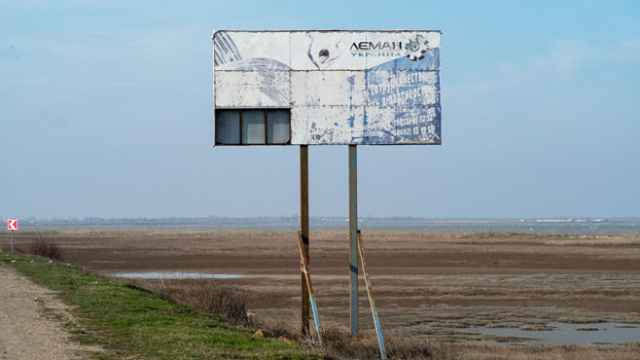
A buffer zone roughly 1 kilometer wide separates Russian border control from Ukrainian positions.
Blame
An unusually tender depiction of Vladimir Putin greets travelers arriving at Simferopol's main transport hub. "Crimea. Russia. Forever," the billboard's slogan reads. Putin's face is everywhere here: on notebooks, posters, mugs and passport holders.
The undeniable trials that locals have been through during the past year have left Putin's image largely untarnished. Neither power, water and supply shortages have turned them against the Kremlin.
The complaints you hear on Simferopol's streets are instead aimed against local officials. Since most Crimean public officials also served the Ukrainian regime before the annexation, continuing inefficiency and corruption is excused as a legacy of the old, rather than a new development. Things are bad, but hardly Moscow's fault, the argument goes.
Meanwhile, reports of continuing bloodshed in eastern Ukraine serve as a reminder of what could have awaited the peninsula had it not been rescued, as many locals see it. "People believe Putin saved Crimea from war," said 25-year-old Svetlana at a café in central Simferopol. "No matter how difficult life here gets, it is always better than what could have been."
In some respects, life for Crimea's 2 million residents became easier in its second year following annexation. Many of Crimea's famously potholed roads have received a fresh layer of tarmac, with the authorities investing billions of rubles in upgrading its infrastructure.
Less time is being spent in lines. By now, most residents are in possession of a Russian passport, health insurance and Russian license plates for their cars. But as the mountain of red tape nears its end, hopes of a quick fix to the peninsula's problems have also begun to dwindle.
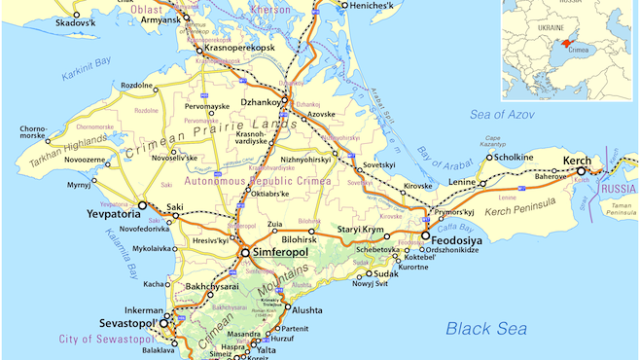
A map of Crimea.
Along with Russian citizenship, Crimeans have also inherited Western sanctions and a ruble tied to dropping oil prices.
Back in 2014, pensioners represented one of the strongest groups in favor of annexation. Nostalgic memories of youth and ruble pensions were enough to persuade most that life would be better. Yet many locals now complain that their Moscow pensions have been countered by Moscow prices.
"My life is pretty much identical to what it was [under Ukraine,]" said Olga, a woman in her early sixties.
She was initially excited, she says, when annexation almost doubled her pension to 8,000 rubles. But food prices in Crimea have also doubled over the past two years, according to state statistics, and overall inflation has been around 80 percent.
"Whether under Russia or Ukraine, I still can't afford to replace the windows in my home to keep out the cold," she says.
Western sanctions imposed on Russia over the annexation are still in place, meaning payment systems like Visa and MasterCard are officially out of use. Sanctions have also suspended the business of multinationals like McDonald's, which once ran a thriving business in the center of Simferopol's bus station. Now the building stands vacant.
Fazil, 55, remembers when McDonald's opened its first branch in Moscow in 1990 to great fanfare. The fast food chain's departure from Simferopol means more to him than just a reduction in his burger consumption. "Crimea is taking a step backwards. Companies like McDonald's were a sign of civilization," he says.
With a large part of the peninsula indirectly or directly dependent on tourism for their incomes, the drop in Ukrainian visitors has hit people's wallets. Only 4.5 million people visited the peninsula last year, compared to roughly 6 million before the annexation, according to statistics from Russia's federal Rosturizm agency.
This year, Crimea is banking on planeloads of Russian tourists — a result of the weak ruble and a ban on popular holiday destinations Egypt and Turkey.
Taxi driver Ervin is skeptical. "The solution to our problems is always one day away," he says. "But that day somehow never arrives."
Silence
Following the annexation, most Crimeans with outright pro-Ukrainian sympathies fled the peninsula, often out of fear they would face backlash from the new Moscow-appointed authorities. Those who remain have steadily been pacified or alternatively marginalized, portrayed as posing a threat to stability.
"We've been branded extremists and provocateurs," says Leonid Kuzmin, 25. "Any display of loyalty to Kiev, even showing the Ukrainian flag, is seen as stirring unrest."
Kuzmin is one of roughly a dozen openly pro-Kiev activists still in Simferopol. The group stages Ukrainian film screenings and organizes small pickets around significant dates such as the birthday of Ukrainian poet Taras Shevchenko.
His activities have had consequences. He was fired from his job as a history teacher last year and is frequently called in for questioning by the Russian security services and the Prosecutor General's Office. The problem is typically settled with a 10,000-ruble fine — a price Kuzmin is more than willing to pay to fly the Ukrainian flag in public.
"We will never get the same Crimea back again," he recognizes. "But we need to show that we exist, that we're here. Our strategy is one of survival."
Few of those Crimeans who share Kuzmin's views are as open in showing their support, however.
Svetlana, a painter, says she grew up in a "Russophile" home in Simferopol; her parents had a portrait of Tsar Nicholas II hanging on the wall. At the same time, she has always felt Ukrainian, and was "shocked" by the ease with which Russia took over two years ago. She isn't ready to say so in public, though.
"Silence is the only way in which people with such radically different opinions can continue to live together," she says. "The vase has been broken. There's nothing I can do about it now."
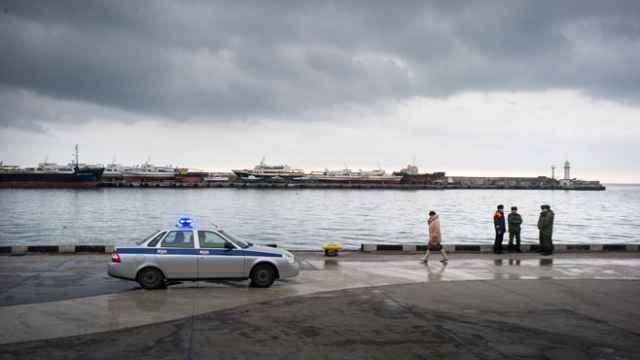
The port of Yalta used to be a stopping point for huge international cruise ships. Now it lies deserted, hampered by Western sanctions.
The Fight
Amina, a bubbly 30-year-old singer, lives in Ivanovka, a village about an hour's drive away from Simferopol. Ahead of the interview, she has filled the kitchen table with food — roast chicken, potatoes, salads and homemade wine. "Crimean Tatar hospitality," she says.
The Crimean Tatar population is a Muslim minority that accounts for roughly 12 percent of Crimea's population. They openly resisted the Russian annexation, boycotting the referendum in which a reported 97 percent voted in favor. Much of the Tatars' distrust in Moscow stems from the decision by Stalin in 1944 to forcibly deport hundreds of thousands of Crimean Tatars to Central Asia. Perhaps half the Tatar population died from starvation or disease as a result of displacement.
"A neighbor I've known my entire life just recently told me that we should all be kicked out again," says Amina. In a village where everyone knows everyone, there is no escaping the hostility. "What have I done to her?" she asks.
It is an example of what many Crimean Tatars describe as the resurfacing of hostility towards Crimea's ethnic minority ever since they returned to the ancestral homeland in the 1980s.
Two years following annexation, their grievances include scores of extrajudicial arrests, kidnappings, murders and raids on their homes and work places in what appears to be a targeted policy directed from the top. ATR, Crimea's only independent television news channel which also broadcast in Tatar and was critical of life under Russian rule, was forced to close last year, allegedly for paperwork violations.
In response, Crimean Tatar activists in Ukraine have become increasingly militant. In September, they set up a road blockade and stopped lorries on their way to Crimea. Several months later, unidentified activists blew up several electricity pylons in Ukraine, causing Crimean homes to go dark. With the reported acquiescence of the Ukrainian authorities, Crimean Tatar activists consequently set up camp at the scene to delay repairs.
The protests have been controversial, with some people criticizing the activists' partnering up with Ukrainian nationalist paramilitaries. But Nariman Dzhelalov, who represents the Crimean Tatars' self-governing body, the Medzhlis, says the embargo was instrumental in Ukraine's decision earlier this year to impose a trade embargo and cut off electricity supplies to Crimea. "It attracted a lot of attention to our cause," he says.
The Medzhlis itself was not formally involved in the blockades but two men connected to it — Mustafa Dzhemilev and Refat Chubarov — played an instrumental role.
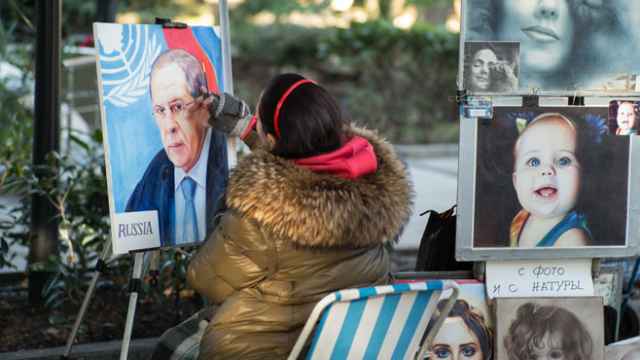
The UN has shown no signs of recognizing Russian Crimea. Legal problems are likely to continue for many years to come.
Dzhemilev is a veteran dissident and was one of the leading figures in campaigning for Crimean Tatars to have been allowed to return to their homeland. Together with Chubarov, he was expelled from Crimea after refusing to cooperate with the pro-Kremlin authorities in the wake of the annexation.
Now prosecutors are targeting the Medzhlis itself, seeking to brand the body an "extremist organization." Such a verdict would see it banned and open the door to members of the body being prosecuted.
Dzhelalov carries a yellow plastic bag with a 600-page-thick stack of papers — "the case against us," he says in a flat voice. He says he can already predict the outcome of the case.
"We don't have any illusions," he says. "This is a political case, and we can't rely on procedure or law as our defense."
Building Bridges
During the four-hour drive to Kerch from Simferopol, billboards carrying a single message interrupt the endless steppe: "Crimean Spring. We're Building Bridges," they say.
It is meant literally. Recent utility disruptions have made the authorities hit the accelerator on projects to reduce Crimea's dependence on Ukraine and connect it to the Russian mainland.
Two underwater power cables have been laid across the bed of the Kerch Strait and another two will be installed by May to connect the peninsula to Russia's power grid. The entire project to make Crimea energy independent, including the building of two power stations, will cost the federal budget 47.3 billion rubles ($665 million).
Most Crimeans' hopes, however, are on the Kerch Bridge — a road and rail connection that will give Crimea an artificial land border with the Krasnodar region on the Russian mainland. It is being built by a company owned by Arkady Rotenberg, a tycoon and childhood friend of Putin's who has been blacklisted by the West over the annexation.
That bridge would turn Kerch into a center of activity.
But not today. Today, strong winds have paralyzed the ferry service that, for now, is Crimea's only lifeline with the Russian mainland. The roads have gone quiet while trucks carrying supplies to the peninsula sit out the weather.
The port city was one of the areas hit hardest by the blackouts. It is also among the cities that will suffer most from Ukrainian limits of water supplies.
Irina Shopalova, a 41-year-old teacher, came home in December only to find that neither her lights nor taps worked. She walked out onto the city's streets. Candles were selling for 70 rubles, roughly three times their original price. Prices for diesel generators skyrocketed. "Some friends of mine had to take out a bank loan," she says.
But less than five kilometers removed from the Russian mainland, many residents of Kerch say the difficulties have empowered them to cut ties with Ukraine.
"We will do whatever it takes not to have to return," says Galina, a woman in her forties who runs a small hotel in the city center.
She is in a good mood: It's been three days since there's been uninterrupted water and electricity. But her real hopes are for the bridge. "That will solve everything," she says.
On her way out of the room she passes a cupboard and, ever so subtly, she knocks three times on the wood.
Some names have been changed at the request of interviewees.
Contact the author at e.hartog@imedia.ru. Follow the author on Twitter at @EvaHartog
A Message from The Moscow Times:
Dear readers,
We are facing unprecedented challenges. Russia's Prosecutor General's Office has designated The Moscow Times as an "undesirable" organization, criminalizing our work and putting our staff at risk of prosecution. This follows our earlier unjust labeling as a "foreign agent."
These actions are direct attempts to silence independent journalism in Russia. The authorities claim our work "discredits the decisions of the Russian leadership." We see things differently: we strive to provide accurate, unbiased reporting on Russia.
We, the journalists of The Moscow Times, refuse to be silenced. But to continue our work, we need your help.
Your support, no matter how small, makes a world of difference. If you can, please support us monthly starting from just $2. It's quick to set up, and every contribution makes a significant impact.
By supporting The Moscow Times, you're defending open, independent journalism in the face of repression. Thank you for standing with us.
Remind me later.


